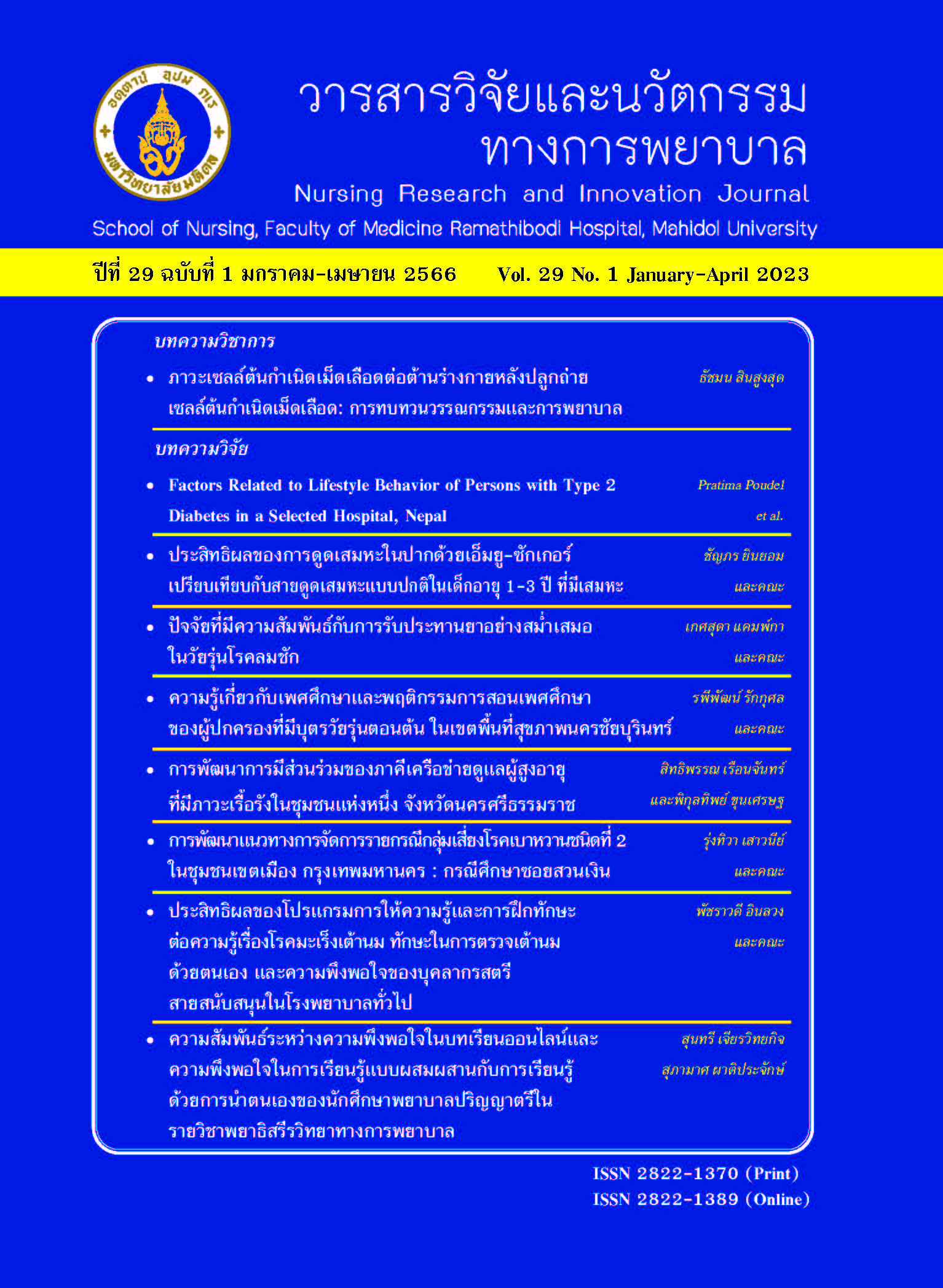The Effectiveness of an Educational and Skill Training Program on Knowledge, Breast Self-examination Skills, and Satisfaction among Female Back-Office Personnel in a General Hospital
Main Article Content
Abstract
Abstract:
This quasi-experimental study with a one-group pretest-posttest design aimed to evaluate the effects of an educational and skill training program on knowledge, breast selfexamination skills, and satisfaction among female back-office personnel in a general hospital.The program included teaching about breast cancer and self-examination, demonstration, and return demonstration with the breast self-examination simulator model. Seventy-eight female participants in the back office were enrolled by purposive sampling. Research tools comprised questionnaires to elicit baseline characteristics and knowledge about breast cancer, a checklist of breast self-examination, and an evaluation form of satisfaction with the educational program.Baseline characteristics were analyzed using descriptive statistics. The percentage of accuracy between pre and post-intervention for each item of knowledge and skills on breast selfexamination was compared using Pearson’s chi-squared test or Fisher’s exact test. Their magnitudes of difference were estimated using quantile regression. Satisfaction with this training was also evaluated and described. Results of the study showed a significant increase in both the median score of breast cancer knowledge and the median score of skill performance of breast self-examination after training. Most participants were satisfied with the program from the high to the highest level. Hence, the teaching, demonstration and return demonstration techniques in this educational and skill training program can be employed to promote breast self-examination among female personnel in the back office.
Keywords: Breast self-examination, Demonstration, Female back-office personnel, Return demonstration, Teaching
Article Details

This work is licensed under a Creative Commons Attribution-NonCommercial-NoDerivatives 4.0 International License.
บทความ ข้อมูล เนื้อหา รูปภาพ ฯลฯ ที่ได้รับการตีพิมพ์ในรามาธิบดีพยาบาลสาร ถือเป็นลิขสิทธิ์ของวารสาร หากบุคคลหรือหน่วยงานใดต้องการนำทั้งหมดหรือส่วนหนึ่งส่วนใดไปเผยแพร่หรือเพื่อกระทำการใด ใด จะต้องได้รับอนุญาตเป็นลายลักษณ์อักษรจากรามาธิบดีพยาบาลสารก่อนเท่านั้น
References
World Health Organization. Cancer today: all cancers:international agency for research on cancer, World Health Organization; 2020 [cited 2022 April 1]. Available from:https://gco.iarc.fr/today/fact-sheets-cancers
World Health Organization. Estimated age-standardized mortality rates (World) in 2020, worldwide, females, all ages (excl. NMSC): international agency for research on cancer, World Health Organization; 2020 [cited 2022 April 1]. Available from: https://gco.iarc.fr/today/online-analysis-multi-bars
World Health Organization. Cancer today: Thailand population fact sheets: international agency for research on cancer, World Health Organization; 2020 [cited 2022 April 1]. Available from: https://gco.iarc.fr/today/data/factsheets/populations/764-thailand-fact-sheets.pdf
World Health Organization. Regional office for the Eastern M. Guidelines for the early detection and screening of breast cancer. World Health Organization; 2006.
National Cancer Institute. Cancer in Thailand Vol. IX. In:Imsamran W, Pattatang A, Supaattagorn P, Chiawiriyabunya I, Namthaisong K, Wongsena M, et al., editors. Bangkok:New Thammada Press; 2018. (in Thai)
Nichols M. The nurse’s role in self-breast examination education. Plast Surg Nurs. 2012;32(4):143-5.
Ramakant P, Singh KR, Jaiswal S, Singh S, Ranjan P,Rana C, et al. A survey on breast cancer awareness among medical, paramedical, and general population in North India using self-designed questionnaire: a prospective study. Indian J Surg Oncol. 2018;9(3):323-7.
Saeed S, Asim M, Sohail MM. Fears and barriers: problems in breast cancer diagnosis and treatment in Pakistan. BMC Womens Health. 2021;21(1):151.
Persson K, Ek AC, Svensson PG. Factors affecting women to practise breast self-examination. Scand J Caring Sci.1997;11(4):224-31.
Fletcher SW, O’Malley MS, Earp JL, Morgan TM, Lin S, Degnan D. How best to teach women breast selfexamination:a randomized controlled trial. Ann Intern Med. 1990;112(10):772-9.
Li C, Liu Y, Xue D, Chan CWH. Effects of nurse-led interventions on early detection of cancer: a systematic review and meta-analysis. Int J Nurs Stud. 2020;110:103684.
Bhakta P. Asian women’s attitudes to breast selfexamination.Nurs Times. 1995;91(8):44-7.
Jamjang S, Atthamaethakul W, Prayoontap S. The effects of breast self–examination acquisition program on knowledge, attitude and breast self–examination skill among nursing students. Journal of Nursing and Education.2020;13(4):77-91. (in Thai)
Komonwipast N, Pakdevong N. Comparison of knowledge,health belief, and perceived self-efficacy between female students who performed and did not perform breast selfexamination.Songklanagarind Journal of Nursing.2018;38(4):68-78. (in Thai)
Noitung S, Lapvongwatana P, Chansatitporn N. Effects of the health belief model program for breast cancer prevention among female high school students in the Bangkok metropolitan area. Thai Red Cross Nursing Journal. 2018;11(2):78-99. (in Thai)
Panupornpong T. The effectiveness of a breast selfexamination behavior enhancement program for women breast cancer screening, Nakhon Ratchasima Province.Journal of Health Research and Development (Nakhon Ratchasima Public Health Provincial Office). 2021;7(1):140-57. (in Thai)
Patistea E, Chliaoutakis J, Darviri C, Tselika A. Breast self-examination: knowledge and behavior of Greek female health care professionals working in primary health care centers. Cancer Nurs. 1992;15(6):415-21.
Rosenstock IM. The health belief model and preventive health behavior. Health Educ Monogr. 1974;2(4):354-86.
Becker MH. The health belief model and sick role behavior.Health Educ Monogr. 1974;2(4):409-19.
Hacihasanoglu R, Gozum S. The effect of training on the knowledge levels and beliefs regarding breast selfexamination on women attending a public education centre.Eur J Oncol Nurs. 2008;12(1):58-64.
McDonald S, Saslow D, Alciati MH. Performance and reporting of clinical breast examination: a review of the literature. CA Cancer J Clin. 2004;54(6):345-61.


